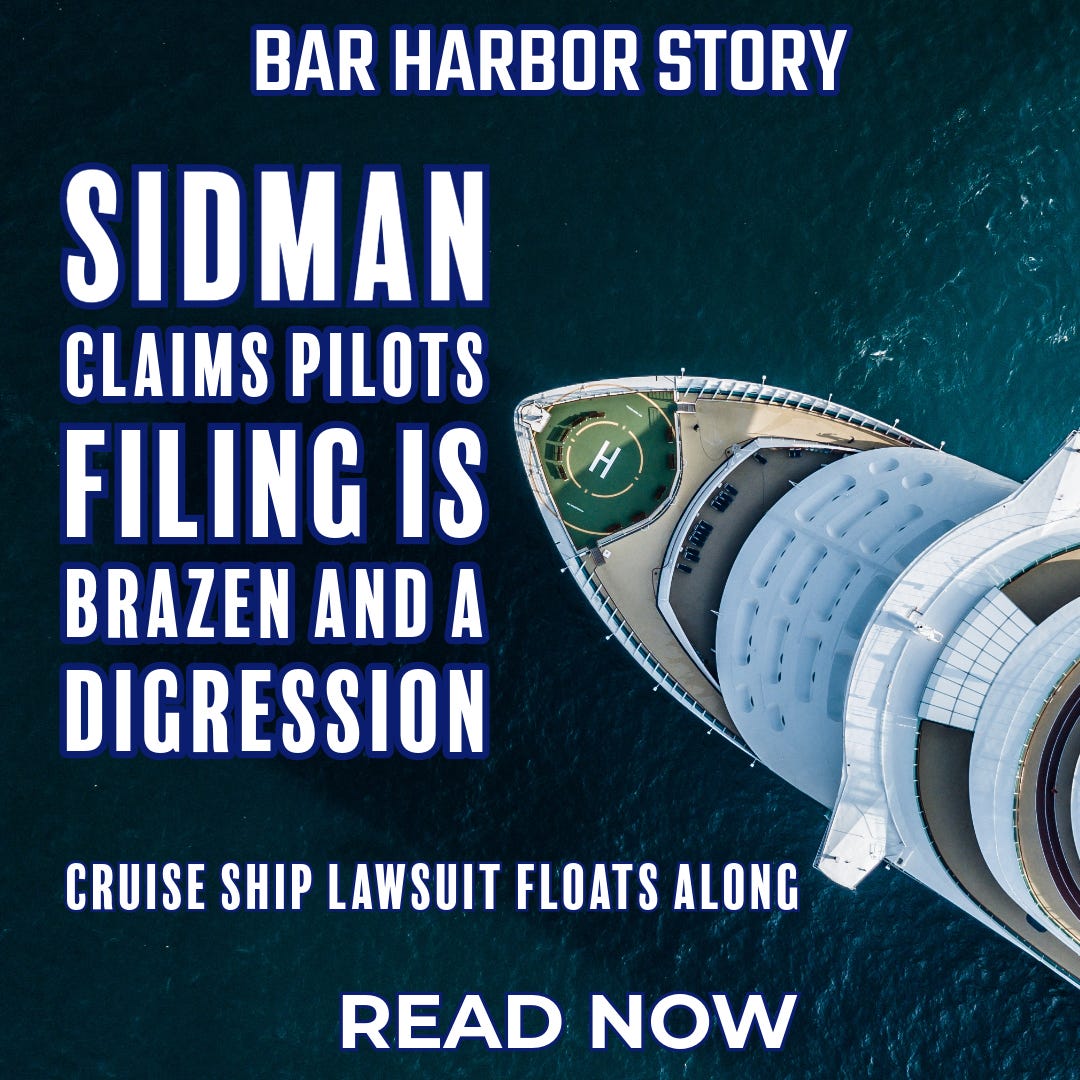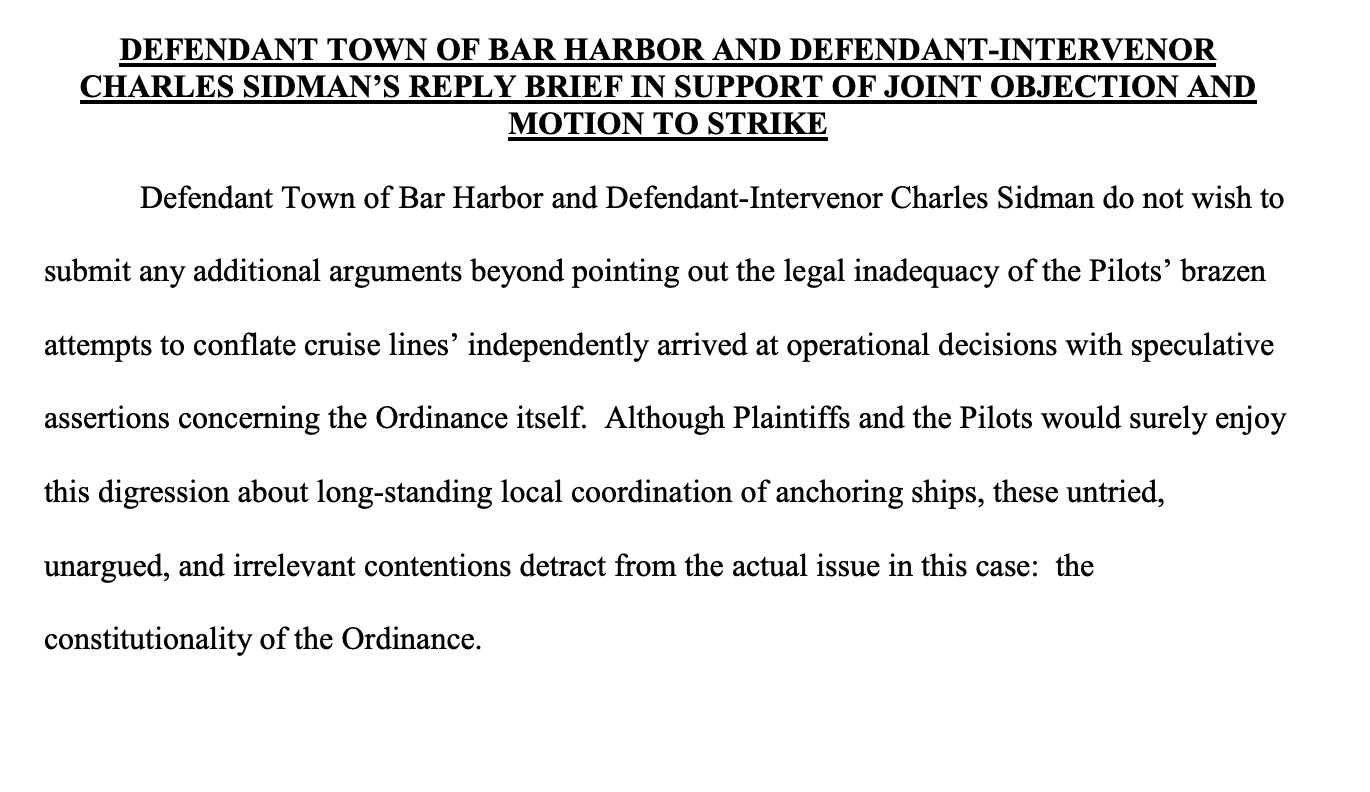BAR HARBOR AND BANGOR—Charles Sidman has replied to a motion to support the Town of Bar Harbor’s and Sidman’s objection to strike arguments from the Penobscot Bay and River Pilots Association’s latest rebuttal and three exhibits. Sidman is the defendant intervenor in the case, which objects to cruise ship daily disembarkation limits of 1,000. The brief was filed November 13.
The brief reads in its entirety,
It is now up to Judge Lance E. Walker to determine if any of the brief or its exhibits should be struck.
The Town of Bar Harbor and Sidman filed a motion to strike pieces of a trial brief filed by the Penobscot Bay and River Pilots Association case against the Town of Bar Harbor and new cruise ship limits approved by voters in November 2022. The association and The Association to Preserve and Protect Local Livelihoods (APPLL) filed the suit against the town last December, saying that the changes and 1,000 daily cruise ship disembarkation limits violate the U.S. Constitution and federal law.
APPLL and the pilots’ group had until November 9 to respond to the motion to strike. Both filed their opposition to the town’s motion to strike by Walker’s federal court deadline.
The briefs that the defendants are trying to strike include three exhibits, one of which is the Town Council’s October 17 agenda, which is most of the bulk of the 162-pages of exhibits. Two other exhibits are 2025 itineraries by the Holland America and Norwegian Cruise Lines. Both cruise lines have featured Bar Harbor in their New England destinations.
The town moved to strike the exhibits because they believe they “are not part of the evidentiary record developed at trial.” That trial occurred in July. They also argue that any of the Pilots Association’s arguments relating to those exhibits should also be struck.
Bar Harbor and Sidman also both argued via the November filing that the association makes “an entirely new argument, first raised in their reply brief, that the town requiring that cruise ships make reservations with the local harbormaster, or the harbormaster assigning ships to one of the federal anchorages, is unconstitutional.” The town also argues that the argument is not relevant to whether or not the ordinance is constitutional.
In its November 9 response, the association argued,
“These Exhibits were proffered in direct response to positions taken by Defendant Town of Bar Harbor (the “Town”) and Defendant-Intervenor Charles Sidman (“Sidman” and with the Town, “Defendants”) in their post-trial briefs. The Exhibits reinforce, but are not essential to, arguments that the Pilots advanced and fully supported in their opening brief. On November 1, Defendants jointly moved to strike the Exhibits and related, limited arguments in the Pilots’ Reply Brief. Defendants contend that the Pilots rely on the Agenda to advance an “entirely new” argument but fail to acknowledge that this “new” argument responds directly to the Town’s assertion of regulatory authority over federal anchorage grounds in its post-trial brief. Defendants object to the Exhibits on grounds of authenticity and timing but do not suggest that their authenticity is genuinely in dispute or acknowledge that all documents (including the Agenda, which is the Town’s document) were created well after discovery and trial. Defendants’ protestations do not warrant the relief Defendants seek.”
WHAT THE TOWN IS CURRENTLY DOING ABOUT NEXT SEASON
Town Council Chair Valerie Peacock explained during a September meeting that while the federal case against the town’s cruise ship limits is in court, the town is running two parallel threads as it tries to determine how to deal with upcoming seasons in two different scenarios.
In the first scenario, the changes to the land use ordinance are upheld and the town wins the lawsuit. That would mean that the disembarkation rules limiting cruise ship disembarkations to 1000 or less a day (without fines) are upheld or partially upheld. Those plans have been discussed in executive sessions because of the litigation, but the town expects a draft to be made public in October. Town Attorney Stephen Wagner said it will be a stand-alone ordinance and include updates to the Harbor portion of the land use ordinance as well as updates to standard operating procedures.
In the second scenario, the town loses the case and the changes are not upheld. If that occurs, the town would continue with the new memorandums of agreement (MOAs) that the town began in 2022. Those MOAs also limited cruise ship visitation, but were not based on passenger disembarkations.
The memorandums of agreement are the town’s agreements with cruise lines about when they can visit and other details. These documents are currently being used as the town waits for the federal court decision.
The current MOAs expire at the end of December and have to be renegotiated, Peacock has said.






